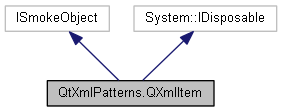|
Qyoto
4.0.5
Qyoto is a C# language binding for Qt
|
|
Qyoto
4.0.5
Qyoto is a C# language binding for Qt
|
The QXmlItem class contains either an XML node or an atomic value. More...


Public Member Functions | |
| QXmlItem () | |
| | |
| QXmlItem (QXmlItem other) | |
| | |
| QXmlItem (QXmlNodeModelIndex node) | |
| | |
| QXmlItem (object atomicValue) | |
| | |
| virtual void | CreateProxy () |
| new bool | IsAtomicValue () |
| | |
| new bool | IsNode () |
| | |
| new bool | IsNull () |
| | |
| new object | ToAtomicValue () |
| | |
| new QXmlNodeModelIndex | ToNodeModelIndex () |
| | |
| new void | Dispose () |
Protected Member Functions | |
| QXmlItem (System.Type dummy) | |
Protected Attributes | |
| SmokeInvocation | interceptor |
Properties | |
| virtual System.IntPtr | SmokeObject [get, set] |
The QXmlItem class contains either an XML node or an atomic value.
In XQuery, all expressions evaluate to a sequence of items, where each item is either an XML node or an atomic value. The query in the following snippet evaluates to sequence of five items.
<aNode/>,
xs:base64Binary("FFFF"),
current-date(),
3e3, (: A floating point value :)
attribute {"name"} {()}
The five items are: An element, an atomic value (binary data encoded in base64), a date, a float, and an attribute.
QXmlItem is the class that represents these XQuery items in the QtXmlPatterns API. A non-null instance of QXmlItem is either a node or an atomic value. Calling isNode() or isAtomicValue() tells you which it is. Atomic values are represented elsewhere in the Qt API as instances of QVariant, and an instance of QXmlItem that represents an atomic value can be converted to a QVariant by calling toAtomicValue(). A QXmlItem that wraps a node is represented elsewhere as an instance of QXmlNodeModelIndex. A node QXmlItem can be converted to a QXmlNodeModelIndex by calling toNodeModelIndex().
A default constructed QXmlItem instance is neither a node nor an atomic value. It is considered null, in which case isNull() returns true.
An instance of QXmlItem will be left dangling if the XML node model it refers to is deleted, if it is a QXmlNodeModelIndex.
|
protected |
| QtXmlPatterns.QXmlItem.QXmlItem | ( | ) |
Constructs a null QXmlItem that is neither a node nor an atomic value. isNull() returns true for a default constructed instance.
| QtXmlPatterns.QXmlItem.QXmlItem | ( | QXmlItem | other | ) |
The copy constructor constructs a copy of other.
| QtXmlPatterns.QXmlItem.QXmlItem | ( | QXmlNodeModelIndex | node | ) |
Constructs a node QXmlItem that is a copy of node.
See also isNode().
| QtXmlPatterns.QXmlItem.QXmlItem | ( | object | atomicValue | ) |
Constructs an atomic value QXmlItem with atomicValue.
See also isAtomicValue().
|
virtual |
| new void QtXmlPatterns.QXmlItem.Dispose | ( | ) |
| new bool QtXmlPatterns.QXmlItem.IsAtomicValue | ( | ) |
Returns true if this item is an atomic value. Returns false if it is a node or null.
See also isNull() and isNode().
| new bool QtXmlPatterns.QXmlItem.IsNode | ( | ) |
Returns true if this item is a Node. Returns false if it is an atomic value or null.
See also isNull() and isAtomicValue().
| new bool QtXmlPatterns.QXmlItem.IsNull | ( | ) |
| new object QtXmlPatterns.QXmlItem.ToAtomicValue | ( | ) |
| new QXmlNodeModelIndex QtXmlPatterns.QXmlItem.ToNodeModelIndex | ( | ) |
If this QXmlItem represents a node, it returns the item as a QXmlNodeModelIndex. If this QXmlItem is not a node, the return value is undefined. You can call isNode() to test whether the item is a node.
See also isNode().
|
protected |
|
getset |